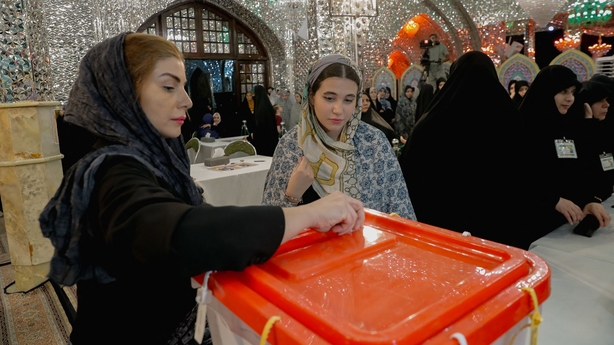Iran's president-elect, a relative moderate who beat a hardline rival to win election but who will likely be constrained in how much change he can effect, urged Iranians to stick with him on "the difficult road ahead".
Masoud Pezeshkian, the sole moderate in the original field of four candidates, won yesterday's run-off presidential vote against former nuclear negotiator Saeed Jalili.
He will replace hardline president Ebrahim Raisi, who was killed in a helicopter crash in May.
Mr Pezeshkian, a 69-year-old cardiac surgeon, has pledged to promote a pragmatic foreign policy, ease tensions over now-stalled negotiations with major powers to revive a 2015 nuclear pact and improve prospects for social liberalisation and political pluralism.
However many Iranians are sceptical about his ability to fulfil his campaign promises as Supreme Leader Ayatollah Ali Khamenei, not the president, is the ultimate authority in the Islamic Republic.
"Dear people of Iran, the election is over, and this is just the beginning of our working together. A difficult road is ahead. It can only be smooth with your cooperation, empathy and trust," Mr Pezeshkian said in a post on social media platform X.
"I extend my hand to you and swear on my honour that I will not abandon you on this path. Do not abandon me."
After the voting result is confirmed by a hardline election watchdog body and approved by the supreme leader, Mr Pezeshkian will take the oath of office before parliament in Tehran in the coming days.
Turnout was almost 50% in yesterday's vote, following historically low turnout in the first round ballot on 28 June.

Mr Pezeshkian managed to win with a constituency - whose core was believed to be mostly the urban middle class and young - that had been widely disillusioned by years of security crackdowns that stifled any public dissent from Islamist orthodoxy.
One Iranian source said Mr Pezeshkian enjoys an insider status and close relationship with theocratic Mr Khamenei, and may be able to build bridges between factions to yield moderation, but not bring about fundamental changes that many Iranians yearn for.
The Islamic Republic has experienced two approaches to reform. The first from 1997 to 2005, was when president Mohammad Khatami sought political reforms, a stronger civil society, and more press freedom, but was opposed by Mr Khamenei and the powerful Revolutionary Guards.
The second was led by pragmatist Hassan Rouhani from 2013 to 2021. He used his political capital to secure the supreme leader's consent to the 2015 nuclear pact, leaving nothing for domestic reforms.
Foreign policy
Mr Pezeshkian's victory lifted hopes of a thaw in Iran's relations with the West that might create openings for defusing its nuclear dispute with world powers.
Commending what he called a "high turnout", Mr Khamenei congratulated Mr Pezeshkian on his win and counselled him to continue Mr Raisi's policies.
Videos on social media showed Mr Pezeshkian's supporters dancing in streets in many cities and towns across the country and motorists honking car horns to cheer his victory.
The election coincided with escalating regional tension due to the conflicts between Israel and Iranian allies Hamas in Gaza and Hezbollah in Lebanon, as well as increased Western pressure on Iran over its fast-advancing nuclear programme.
Under Iran's dual system of clerical and republican rule, the president cannot usher in any major policy shift on Iran's nuclear programme or support for militia groups across the Middle East, since the supreme leader calls all the shots on top state matters.
However, the president can influence the tone of Iran's policy and he will be closely involved in selecting the successor to Mr Khamenei, now 85.
Backed by Iran's reformist camp led by Mr Khatami, Mr Pezeshkian is faithful to Iran's theocratic rule and has no intention of confronting the powerful security hawks and clerical rulers.
Foreign leaders sent congratulatory messages to Iran’s new president, among them Russian President Vladimir Putin and Saudi Arabia's King Salman and Crown Prince Mohammed bin Salman.

